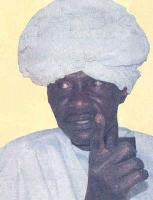Sudan may file charges against militia leader indicted by ICC
August 11, 2008 (KHARTOUM) – The newly appointed special prosecutor for Darfur said that he will review allegations that were brought against a militia leader indicted by the International Criminal Court (ICC) last year.

However Mohamed was noncommittal on whether Kushayb will actually stand trial after being previously cleared of all accusations by Sudanese authorities.
The judges of the ICC issued arrest warrants in April 2007 for Ahmed Haroun, state minister for humanitarian affairs, and Kushayb in connection with Darfur war crimes.
The ICC prosecutor Luis Moreno-Ocampo said in his application at the time that Haroun and Kushayb “bear criminal responsibility in relation to 51 counts of alleged crimes against humanity and war crimes, including persecution, torture, murder and rape committed in Darfur in 2003 and 2004”.
Khartoum had long claimed that Kushayb was in custody since November 2006 for investigations into allegations of violations he committed during the peak of the Darfur conflict in 2004.
Sudan’s former Justice Minister Mohamed Ali al-Mardi told a news conference in Khartoum in February 2007 that “Ali Kushayb, along with two other individuals, was sent for trial. He was detained as a suspect, questioned, his statements were evaluated and witness statements recorded, and then the decision was taken to refer him to court”.
But in March 2007 Kushayb’s trial was delayed when the defendants filed an appeal with the Justice ministry after which Abu-Zeid told reporters that Kushayb’s appeal was denied that there is “sufficient evidence to proceed with the case”.
Shortly afterwards the Sudanese justice ministry ordered a ban on publishing reports or details relating to criminal cases on Darfur conflict and many observers at the time voiced skepticism over Khartoum’s seriousness to try perpetrators of crimes in the war ravaged region.
In early October Sudan’s former foreign minister Lam Akol told the pro-government daily Al-Rayaam from New York that Kushayb was freed “due to lack of incriminating evidence against him”.
However Al-Mardi issued a quick denial to the Al-Rayaam report describing it as “false” without directly commenting on Akol’s statements.
The former Justice Minister was asked again by Al-Rayaam last November on the whereabouts of Kushayb and he reiterated that the militia leader was “never released” before saying that he refrained from commenting on the issue “because it is under investigation”.
Then in April the spokesman for the Sudanese embassy in London, Khalid Al-Mubarak was quoted by Voice of America (VOA) as saying that Haroun and Kushayb were not prosecuted “because there is no evidence against them”.
In June Amin Hassan Omar, a leading figure in the National Congress Party (NCP) and a state minister also confirmed Kushayb’s release.
Ocampo announced in mid-July that he requested an arrest warrant against Sudanese president Omar Hassan Al-Bashir. Following that Sudan has been looking into ways that would allow it to avoid confrontation with the international community over the ICC.
Last week the Sudanese justice minister Abdel-Basit Sabdarat appointed the special prosecutor as part of legal means to deflect ICC jurisdiction over Darfur case.
Sudan news agency (SUNA) said that the special prosecutor will report monthly on the progress of his work.
But some political figures cautioned that this step is belated.
Sudan’s former prime minister and leader of the Umma Party Al-Sadiq Al-Mahdi told the Qatar based Al-Jazeera Arabic TV that the move is “unfortunate” and “sends wrong signals to the international community”.
Also the Secretary General of Sudan’s communist party Ibrahim Nugud speaking to Al-Jazeera said that “any decision [on special courts] made that doesn’t convince rebel groups is worthless”.
The ICC Statute prevents investigation into crimes that were looked into by local judiciary under the concept of “complementarity”.
But Khartoum must prosecute Haroun and Kushayb for the same accusations brought against them by the ICC in order for the latter to lose jurisdiction over their cases.
Sudan’s penal code does not include punishment for genocide, crimes against humanity or war crimes. Moreover Sudanese military officials enjoy immunity from prosecution for acts committed during their course of duty.
But the Agence France Presse (AFP) news agency quoted the Sudanese Media Centre (SMC), which is close to the intelligence services, as saying that the justice ministry is making arrangements to draft new legislation that would incorporate crimes listed in international law.
However it is not clear how long the process would take.
Ocampo told Sudan Tribune in an interview yesterday that Khartoum established special courts before but “end up investigating no one”.
Sudan has not ratified the Rome Statute, but the UNSC triggered the provisions under the Statute that enables it to refer situations in non-State parties to the world court if it deems that it is a threat to international peace and security.
(ST)
